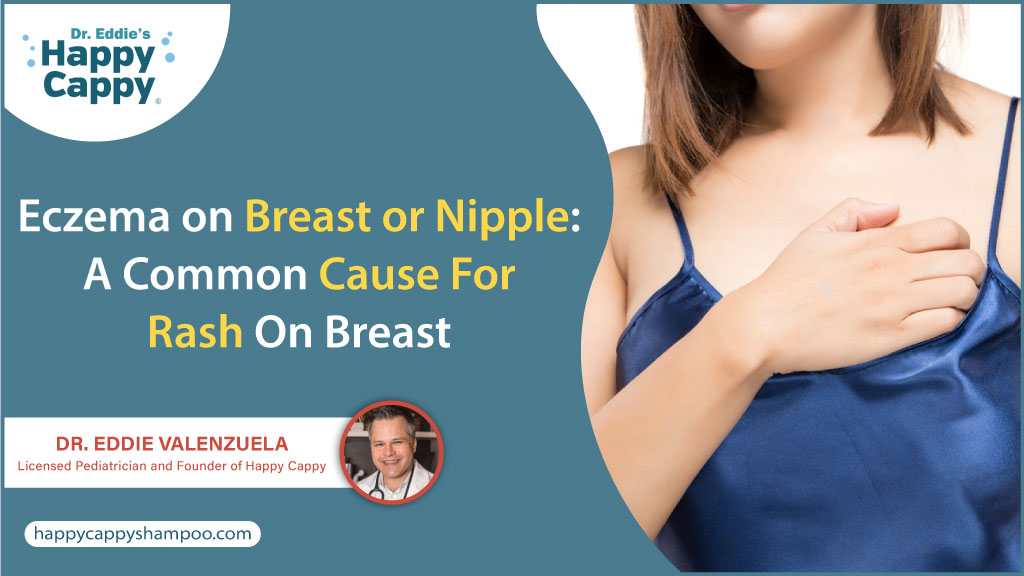
Can You Get Eczema On Breast?
If you are wondering if that dry, flaky, red rash on your breast might be eczema. Then the answer is Yes. Eczema can appear anywhere on the body including your breasts.
It knows no age limit or gender boundaries. Anyone male, female, baby, or adult can experience breast eczema.
What is Breast Eczema?
Eczema commonly known as atopic dermatitis is a very common skin condition. In the USA it affects almost 16.5 million adults and 9.6 million children.
It is a chronic skin condition that causes red, irritated, dry, itchy rashes on the skin. Eczema on the breast is when the eczema rash appears on the breast or under the breast. It may also appear on the areola and nipples. When this occurs it can be referred to as eczema on nipple or dermatitis of areola.
Breast eczema can make the skin crack, develop small bumps, and cause it to change color. Eczema rash may appear as red on lighter skin tones while on darker skin tones it is of purple or brown colour.
People who have a medical or family history of eczema are more prone to it. Even though it is more common in females, anyone can experience it.
Atopic dermatitis on the breast is not a harmful disease and is not contagious. But if left untreated it can cause intense itching, burning sensation, and infection if you scratch the rash.
Eczema no matter where on the body can be easily managed by following a simple skincare routine.
What Does Breast Eczema or Nipple Look Like?
Some of the most common symptoms of breast eczema are:
- Redness around the breast
- Flaky, dry skin on the breast.
- Itchy skin
- Dry, cracked nipples
- Change in skin color of breasts
- Breakouts under or between the breasts.
- Sensitive skin on the chest
- Small bumps on the breast that may ooze
- Cracked nipples
Itching is a prominent symptom of eczema on the breast, but it can also be caused due to other conditions. To get a proper diagnosis of the issue it is best to consult a doctor.
What Causes Eczema On The Breast?
Eczema whether on the breast or any other part of the body, the exact cause of it is still unknown. The researchers believe eczema on the chest is caused by a combination of environmental and genetic factors.
The most common causes of eczema are:
-
Genetics
Genetics plays a vital role in causing eczema on the breast. People who have a family or medical history of eczema, asthma, and hay fever are more likely to develop it.
-
Overactive Immune System Response
Breast eczema or you can call it contact dermatitis on the chest can be caused when the skin comes in contact with a certain type of allergens or irritants.
These are the things that may not be harmful in general but your body’s immune system considers them harmful and reacts in reaction as rashes.
Several factors may trigger breast contact dermatitis such as allergy to certain types of fabric, use of chemical products on breast, and allergic food reaction.
-
Skin Barrier Dysfunction
Our skin contains a top layer that protects it from irritants. It is also responsible for keeping the moisture in the skin.
When the skin barrier is disrupted it does not work properly and allows irritants and bacteria to come in the skin. The skin also becomes dry as it is unable to retain moisture in the skin. This causes the skin on the breast to become red, flaky, and itchy.
-
Environmental Triggers
There are several environmental triggers that can cause an eczema flare-up such as extremes in weather, it can cause the skin to lose moisture and become dry making it more prone to eczema.
Some other environmental factors that can cause breast eczema are heat, sweating, and chemicals in skincare products.
-
Stress
Even though stress has no direct connection to causing eczema on breast but by some researchers it is considered to worsen the condition. If you are already experiencing a breast eczema flare-up, then stress can make the condition worse as it can cause the skin to become dry and exacerbate the itching.
Triggers Of Breast Dermatitis
If you had eczema in the past there are chances you may experience it again as eczema flare-up. There are certain factors that can trigger breast eczema.
- Excessive scratching and rubbing.
- Dry air.
- Food allergies.
- Chemicals in skin care products.
- Use of harsh soaps.
- Reaction to the detergent used to wash clothes.
- Pollen.
- Pet dander.
- Extreme weather conditions.
- Dry skin.
Paget’s Disease Or Eczema?
Paget’s disease can sometimes be mistaken for breast eczema. Both conditions share similar symptoms which include red rashes on breast, dry, flaky skin on the areola, and intense itching.
The difference between Paget’s disease and eczema is that Paget’s disease is a rare condition and is associated with breast cancer while eczema is a common skin condition. It mostly starts from on the nipple and spreads to the areola while eczema can appear anywhere on the breast.
Paget’s disease is usually a sign of breast cancer, so it is best to be diagnosed and treated as soon as possible. If it is left untreated it may cause bleeding and the nipple to become ulcerated.
If you are unsure about the rash on areola consult a doctor so they can properly diagnose the condition.
Diagnosing Eczema On Breasts
If you are wondering how eczema on nipples is diagnosed then we have got your answer. To diagnose eczema on the breast a doctor will first physically examine the breast.
They will consult about your family and medical history related to eczema. If still in doubt about a rash on breast the doctor may prescribe the following tests:
- Skin allergy test
- Blood test
- Skin biopsy
- Mammogram to check for cancer.
How To Treat Eczema On Your Breast?

Even though there is no permanent cure for eczema it can easily be managed by following a simple eczema skin care routine. It includes the following steps:
-
Keeping It Clean
The most important thing to relieve eczema symptoms in the breast is to keep the affected area clean. Make sure you use a mild and gentle eczema shampoo or cleanser for it.
Products that contain harsh chemicals can further exacerbate the condition. Use a cleanser that contains natural ingredients like Licorice root extract, glycerin, and oatmeal extracts.
Happy Cappy Daily Shampoo and Body Wash for Eczema Prone Skin is a great option to choose from. Dr. Eddie has formulated it to soothe itching, redness, and irritation associated with dry, eczema prone skin. It is fragrance-free, paraben-free, and sulfate-free making it suitable for sensitive skin and people of all ages.
-
Moisturizing Is Essential
Eczema can cause the skin on the breast to become dry and flaky. Which causes intense itching. Breasts have very sensitive skin and itching will not only make the condition worse but can also cause infection.
To help alleviate the dry, itchy skin regularly moisturize the breast. It is advised to use an eczema cream to moisturize the skin at least twice daily. If you suspect your skin is getting dry more often you can apply it more than twice.
Not every moisturizer found in the market is suitable for eczema. Moisturizers like Happy Cappy Moisturizing Cream for Eczema are specially formulated to alleviate the symptoms of eczema on breast. It is fast-absorbing and non-greasy. It soothes eczema symptoms by protecting and locking moisture in the skin, and keeping it hydrated at all times.
-
OTC Medication
In severe cases of eczema or if the eczema on the breast is not controlled by following a proper skin care routine then consult a doctor.
They may prescribe OTC medications such as topical steroids, topical calcineurin inhibitors, antihistamines, and in severe eczema–injectable treatments.
-
Wet Wrap Therapy
Wet wrap therapy can be used to relieve itching and inflammation during an intense eczema flare-up. In this topical steroids are applied to the affected area and covered with a damp cloth for several hours.
It is useful for people who experience intense itching during the night. But applying wet wrap therapy can also cause some side effects in some individuals which is why it is important to consult a doctor before applying it. To know more about wet wrap therapy for eczema read this blog.
Conclusion
Breast eczema is a common skin condition that can cause itchy, dry, irritated skin around, under, and on the breast. Like eczema on any other part of the body, it is caused by a combination of factors such as skin barrier dysfunction, genetics, stress, and environmental factors.
Eczema on the breast can sometimes be confused with other conditions such as psoriasis, breast cancer, and Paget’s disease. So a proper diagnosis of the issue is essential.
Eczema rash on the breast can be managed by keeping the affected area clean and moisturized. Happy Cappy Two-Step Eczema Skincare Routine can be your assistant in soothing redness, irritation, itching, and dry eczema prone skin.
FAQs
Is eczema on breast common?
Yes, eczema on the breast is common. People who have a family or medical history of eczema are more likely to develop it on the chest as well.
Does breast cancer look like eczema?
A disease related to breast cancer known as Paget’s disease first appears as red, dry, scaly, itchy rashes on the breast. Which is why it is often confused with eczema.
Is breast eczema dangerous?
No, breast eczema is not dangerous or harmful. But if left untreated it can cause intense itching and rashes and may lead to skin infections.
Can I wear a Bra if I have breast eczema?
Yes, you can wear one but make sure that the fabric of the Bra does not irritate your skin. And wear a loose bra. If you are comfortable without a Bra, you can remove it during the eczema flare-up.
Who can develop eczema on the breast?
Anyone with a breast or chest can develop eczema on it whether adult, baby, teenager, girl, or boy. Anyone can have it.
